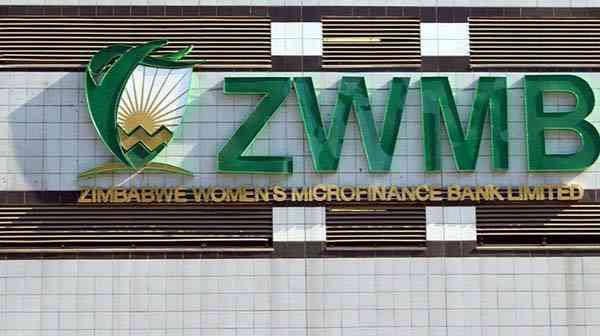News / National
Zimbabwe women's bank opens 11 000 accounts in 2024
6 hrs ago | Views

The Zimbabwe Women Microfinance Bank (ZWMB) opened 11,120 new savings accounts in 2024 as part of the Government's ongoing push to promote financial inclusion and empower marginalized groups - particularly women and youth - across the country.
The figures were revealed in the 2024 annual report released by the Ministry of Women Affairs, Community, Small and Medium Enterprises Development, which detailed progress made under Zimbabwe's financial inclusion strategy.
"The Women's Bank opened 11,120 savings accounts, which is the entry point for financial inclusion," the ministry stated. "In addition, the bank disbursed 4,083 loans worth ZWG205.6 million, creating 2,350 jobs and directly benefiting 4,135 individuals - 3,498 of them women and 637 men."
The financial inclusion strategy, spearheaded in part by the Reserve Bank of Zimbabwe (RBZ), targets barriers that have historically excluded informal traders, rural populations, and women from formal financial systems. By increasing access to savings, credit, training, and mentorship, the Government aims to build inclusive and sustainable economic participation.
Harare led the country in the number of savings accounts opened, recording 6,173, followed by Bulawayo with 1,256. At the other end of the spectrum, Matabeleland North recorded just 15 new accounts, with Matabeleland South opening 19.
In terms of loan distribution, Masvingo Province topped the list, with 747 loans extended to 747 beneficiaries - 513 women and 234 men - receiving a combined ZWG128.8 million.
Mashonaland East followed, where 634 loans worth ZWG8.44 million were disbursed to 640 individuals, including 573 women and 67 men.
Matabeleland South and Matabeleland North remained the least served, with 49 loans and 71 loans disbursed respectively, totaling under ZWG2 million between them.
Beyond financial support, the ZWMB also conducted wide-reaching capacity building programmes. A total of 10,919 individuals underwent orientation on banking services, financial literacy, technical training, and mentorship - all key components of the Government's broader empowerment goals.
In a parallel development, the ministry reported strong progress under its 2024 Call for Proposals, which sought to fund 200 projects through the Zimbabwe Community Development Fund (ZCDF). The fund supports ventures in agriculture, trade, manufacturing, tourism, and waste management.
Thanks to strategic partnerships with development agencies, the ministry exceeded its original target and funded 230 projects nationwide, benefiting 38,561 community members, including 17,452 women and 21,109 men.
"These initiatives have significantly contributed to improving livelihoods and reducing poverty at the grassroots level," the ministry said.
Analysts say the growth in savings accounts and loan disbursements signals growing trust in microfinance institutions and the effectiveness of government-led empowerment programmes.
"Financial inclusion is not just about access to money; it's about transforming lives, building communities, and giving people the tools to create sustainable incomes," said an economic development consultant.
With momentum building, the Zimbabwe Women Microfinance Bank and its partner institutions are expected to play an even bigger role in the country's inclusive economic recovery, especially as Zimbabwe navigates challenges of inflation and limited access to traditional finance.
The figures were revealed in the 2024 annual report released by the Ministry of Women Affairs, Community, Small and Medium Enterprises Development, which detailed progress made under Zimbabwe's financial inclusion strategy.
"The Women's Bank opened 11,120 savings accounts, which is the entry point for financial inclusion," the ministry stated. "In addition, the bank disbursed 4,083 loans worth ZWG205.6 million, creating 2,350 jobs and directly benefiting 4,135 individuals - 3,498 of them women and 637 men."
The financial inclusion strategy, spearheaded in part by the Reserve Bank of Zimbabwe (RBZ), targets barriers that have historically excluded informal traders, rural populations, and women from formal financial systems. By increasing access to savings, credit, training, and mentorship, the Government aims to build inclusive and sustainable economic participation.
Harare led the country in the number of savings accounts opened, recording 6,173, followed by Bulawayo with 1,256. At the other end of the spectrum, Matabeleland North recorded just 15 new accounts, with Matabeleland South opening 19.
In terms of loan distribution, Masvingo Province topped the list, with 747 loans extended to 747 beneficiaries - 513 women and 234 men - receiving a combined ZWG128.8 million.
Mashonaland East followed, where 634 loans worth ZWG8.44 million were disbursed to 640 individuals, including 573 women and 67 men.
Matabeleland South and Matabeleland North remained the least served, with 49 loans and 71 loans disbursed respectively, totaling under ZWG2 million between them.
Beyond financial support, the ZWMB also conducted wide-reaching capacity building programmes. A total of 10,919 individuals underwent orientation on banking services, financial literacy, technical training, and mentorship - all key components of the Government's broader empowerment goals.
In a parallel development, the ministry reported strong progress under its 2024 Call for Proposals, which sought to fund 200 projects through the Zimbabwe Community Development Fund (ZCDF). The fund supports ventures in agriculture, trade, manufacturing, tourism, and waste management.
Thanks to strategic partnerships with development agencies, the ministry exceeded its original target and funded 230 projects nationwide, benefiting 38,561 community members, including 17,452 women and 21,109 men.
"These initiatives have significantly contributed to improving livelihoods and reducing poverty at the grassroots level," the ministry said.
Analysts say the growth in savings accounts and loan disbursements signals growing trust in microfinance institutions and the effectiveness of government-led empowerment programmes.
"Financial inclusion is not just about access to money; it's about transforming lives, building communities, and giving people the tools to create sustainable incomes," said an economic development consultant.
With momentum building, the Zimbabwe Women Microfinance Bank and its partner institutions are expected to play an even bigger role in the country's inclusive economic recovery, especially as Zimbabwe navigates challenges of inflation and limited access to traditional finance.
Source - The Chronicle











































